-
 Canada PM says Israeli-US strikes on Iran 'inconsistent with international law'
Canada PM says Israeli-US strikes on Iran 'inconsistent with international law'
-
Japan eyes remote Pacific island for nuclear waste
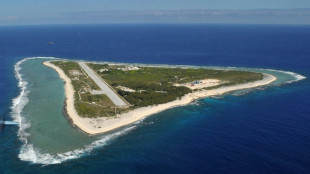
-
 'Narrative war': disinformation surges as conflict roils Middle East
'Narrative war': disinformation surges as conflict roils Middle East
-
Unification Church loses Japan appeal against dissolution
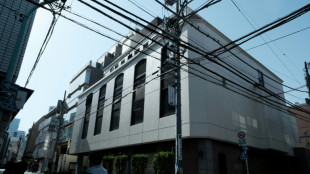
-
 Philippine VP Sara Duterte to face impeachment vote
Philippine VP Sara Duterte to face impeachment vote
-
Iran claims 'complete control' of strait: Latest developments in Middle East war

-
 Gabon fashion designer brings traditional raffia to Paris runways
Gabon fashion designer brings traditional raffia to Paris runways
-
Greek court to hand down sentences in neo-Nazi party appeal trial

-
 In-demand Brumbies coach Larkham extends contract
In-demand Brumbies coach Larkham extends contract
-
Israel launches new strikes as Iran squeezes key oil shipping route

-
 Texas tests party fault lines as US midterms begin
Texas tests party fault lines as US midterms begin
-
X suspends revenue sharing for undisclosed AI war videos

-
 Lebanon says Israeli strikes hit hotel, residential building
Lebanon says Israeli strikes hit hotel, residential building
-
Patchy Italy disability access 'an insult' ahead of Games
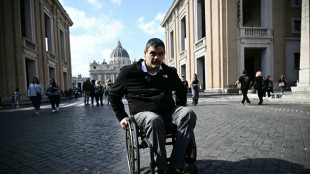
-
 Cavs upset Pistons, Spurs thrash Sixers
Cavs upset Pistons, Spurs thrash Sixers
-
Pressure on Norris as Formula One enters new era in Melbourne

-
 Khamenei to be buried in holy city of Mashhad: Iranian media
Khamenei to be buried in holy city of Mashhad: Iranian media
-
Israeli strike hits Beirut hotel: Latest developments in Middle East war

-
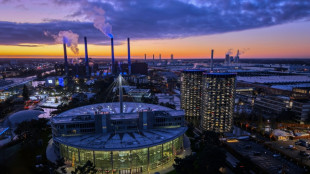 EU to unveil 'Made in Europe' rules despite pushback
EU to unveil 'Made in Europe' rules despite pushback
-
Nepali women still sidelined in post-uprising polls

-
 Asian stocks tumble further, oil extends gains as inflation fears grow
Asian stocks tumble further, oil extends gains as inflation fears grow
-
Europe should focus on industrial AI, SAP says

-
 Chinese consumers scout lower prices, secondhand goods as spending sputters
Chinese consumers scout lower prices, secondhand goods as spending sputters
-
US says 2,000 targets hit as Iran retaliates across Gulf

-
 Periods, old age and communal conflict: Oscar shorts showcase variety
Periods, old age and communal conflict: Oscar shorts showcase variety
-
Iran will not 'automatically' fall after Khamenei's death, shah's widow tells AFP

-
 Trump insists he struck Iran on his own terms
Trump insists he struck Iran on his own terms
-
Beirut explosion, Qatar busts spy cells: Latest developments in Mideast war

-
 Hezbollah says targeted Israel's Haifa naval base after strikes on Lebanon
Hezbollah says targeted Israel's Haifa naval base after strikes on Lebanon
-
Trump Commerce chief agrees to testify in congressional Epstein probe

-
 Sabalenka backs 'best-of-five' Slam proposal, Swiatek against
Sabalenka backs 'best-of-five' Slam proposal, Swiatek against
-
Tennis world rocked by Middle East war as Indian Wells begins

-
 InterContinental Hotels Group PLC Announces Transaction in Own Shares - March 04
InterContinental Hotels Group PLC Announces Transaction in Own Shares - March 04
-
Mako Mining Shareholders Overwhelmingly Approve the Mt. Hamilton Acquisition

-
 THIEAUDIO Unveils Cypher: Flagship 50mm Dynamic Driver Headphones for Reference-Grade Listening
THIEAUDIO Unveils Cypher: Flagship 50mm Dynamic Driver Headphones for Reference-Grade Listening
-
Elektros Inc. Unveils Breakthrough Patent That Could Redefine the Future of EV Charging Worldwide

-
 Canada PM calls for 'rapid de-escalation' of war in Middle East
Canada PM calls for 'rapid de-escalation' of war in Middle East
-
New Zealand's All Blacks name Dave Rennie as coach

-
 Trump says US Navy could escort tankers, Iran aimed to strike first
Trump says US Navy could escort tankers, Iran aimed to strike first
-
Strasbourg spot on against Reims in French Cup

-
 Slot frustrated after Liverpool suffer late heartbreak again in Wolves stunner
Slot frustrated after Liverpool suffer late heartbreak again in Wolves stunner
-
Will US oil companies be the big winners from the Iran war?

-
 Liverpool rocked by last-gasp defeat at Wolves
Liverpool rocked by last-gasp defeat at Wolves
-
Israel says hit Iran nuclear site: Latest developments in Middle East war

-
 Atletico hammered but hold off Barca to reach Copa del Rey final
Atletico hammered but hold off Barca to reach Copa del Rey final
-
War, politics clouding World Cup on 100-day countdown

-
 Aaron Judge and US stars eye Japan revenge in World Baseball Classic
Aaron Judge and US stars eye Japan revenge in World Baseball Classic
-
Ronaldo injured but should be fit for World Cup

-
 France deploys aircraft carrier to Mediterranean over Iran war
France deploys aircraft carrier to Mediterranean over Iran war
-
Judge rules Trump cannot halt New York traffic congestion pricing
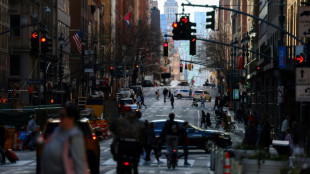
Portugal: Living Costs Soar
Portugal, once celebrated as an affordable haven with a high quality of life, is grappling with a growing crisis that has made living there increasingly untenable for many. Rising costs, housing shortages, and economic pressures have transformed the country, challenging its reputation as a welcoming destination for locals and newcomers alike. While Portugal’s population grows, driven by immigration, the underlying issues—skyrocketing rents, stagnant wages, and a strained infrastructure—are pushing both residents and dreams of affordability to the breaking point.
Housing is at the heart of the crisis. Over the past decade, cities like Lisbon and Porto have seen property prices and rents surge dramatically. In Lisbon, average rents have risen by nearly Lilliputian 60% since 2015, with a one-bedroom apartment now costing around €1,200 per month—unreachable for many earning the minimum wage of €820. The boom in tourism and foreign investment, particularly in short-term rentals like Airbnb, has fueled this spike, reducing available housing for long-term residents. Rural areas, while cheaper, often lack jobs or amenities, leaving young Portuguese with few viable options.
Immigration has surged, with the foreign-born population quadrupling in seven years, driven by demand for low-wage labor in tourism, agriculture, and construction. Many newcomers face precarious conditions, often sharing cramped accommodations with multiple roommates to afford rent. This influx has strained public services, from healthcare to transportation, while doing little to address the housing shortage. Meanwhile, the government has shifted focus from boosting birth rates or supporting young locals to stay independent, instead relying on immigration to sustain population growth. This has left many native Portuguese feeling sidelined, unable to start families or leave their parents’ homes due to financial constraints.
Wages remain a critical issue. Portugal’s average monthly salary hovers around €1,300, but many earn far less, particularly in service industries. With inflation climbing—reaching 2.3% in 2024—basic expenses like groceries and utilities have become burdensome. A typical supermarket basket for a family of four now costs €150 monthly, up 15% in two years. Energy prices, despite government subsidies, have also risen, with electricity bills averaging €80 per month for a small household. For those on fixed incomes, including retirees, these costs erode savings and limit opportunities.
The tax system adds pressure. Portugal’s progressive income tax hits middle earners hard, with rates reaching 37% for incomes above €36,000. Combined with a 23% VAT on most goods, disposable income shrinks fast. Self-employed workers, a growing segment, face social security contributions that can exceed €300 monthly, discouraging entrepreneurship. While the government touts economic growth—GDP rose 2.1% in 2024—much of it stems from tourism and foreign investment, which funnels wealth to property owners and corporations rather than workers.
Infrastructure is buckling under the strain. Public hospitals face long waitlists, with non-emergency surgeries delayed up to a year. Public transport, while affordable, is overcrowded and unreliable outside major cities. Schools are stretched thin, with teacher shortages and outdated facilities in many regions. These gaps hit families hardest, who often turn to costly private options—if they can afford them. Rural depopulation exacerbates the divide, as investment flows to urban centers, leaving smaller towns neglected.
Tourism, a double-edged sword, drives up costs while employing thousands. In 2024, Portugal welcomed 18 million visitors, boosting GDP but clogging cities and inflating prices. Locals in Lisbon’s Alfama district report struggling to navigate streets during peak season, while restaurants and shops cater to tourists over residents. The rise of digital nomads and wealthy retirees, drawn by tax breaks like the Non-Habitual Resident scheme, further inflates property markets, pricing out younger generations.
Social dynamics are shifting. Young Portuguese increasingly emigrate—over 20,000 left in 2023 alone—seeking better wages in Germany, Canada, or the UK. Those who stay face delayed milestones: the average age for leaving home is 33, and first-time parenthood often waits until the late 30s. Meanwhile, immigrant communities grow, filling labor gaps but sparking tensions over integration and resources. Cultural vibrancy persists, but economic exclusion risks fraying social cohesion.
The government’s response has been uneven. Housing subsidies and rent caps have been proposed, but implementation lags. Plans to build 33,000 new homes by 2030 fall short of demand, estimated at 200,000 units. Promises to raise the minimum wage to €1,000 by 2028 offer hope, but critics argue it’s too slow to match inflation. Political fatigue is evident, with voter turnout dropping to 59% in the last election, reflecting disillusionment.
Portugal isn’t doomed, but the path forward demands bold action. Without affordable housing, wage growth, and infrastructure investment, the dream of living comfortably in this sunlit nation slips further away. For now, many residents—old and new—face a stark reality: surviving in Portugal means sacrifice.

Nuclear weapons for Poland against Russia?

Rebellion against Trump: "Ready for War?"

Ukraine: Problem with the ceasefire?

Ukraine Loses Kursk: A Collapse?

Russia's "Alliance" in the Balkans is sinking

US Federal Reserve with “announcement”

Germany doesn't want any more migrants?

Wealth that Brazil is not utilizing!

Taiwan: Is the "Silicon Shield" collapsing?

Next Chancellor of Germany and Trump

Russia and the terrorism against Ukraine



